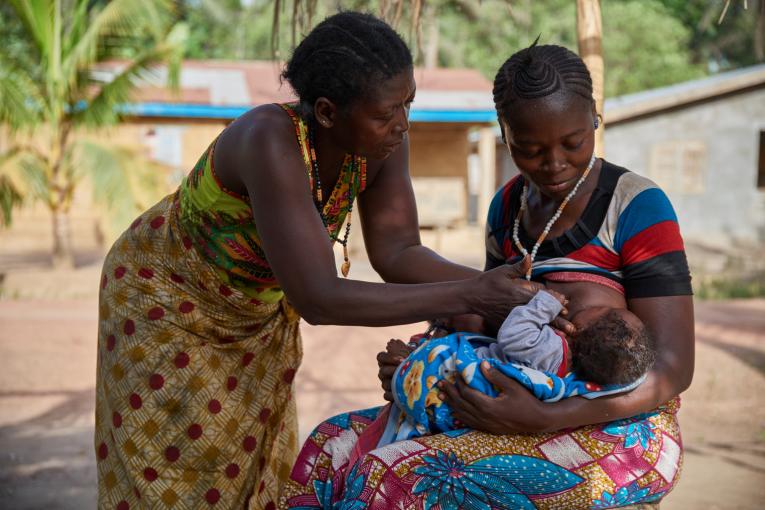Breastfeeding is mandatory
August 1, 2018 | Expert Insights

A joint report by UNICEF and WHO has estimated 78 million newborns have a higher risk of death each year from not drinking their mother's milk within the first hours of being born.
Background
In the 1950s, the London physician Ian G Wickes published a multi-part compendium of feeding practices throughout history, including the changing technology that allowed families to dry feed, a practice also often called hand-feeding. In ancient history, infants were fed with terracotta pots with long spouts, which were sometimes included in infant graves.Infants in ancient Greece were fed wine and honey, while Indian children in the second Century AD were given "diluted wine, soups and eggs" at six months of age. In the US, donkey's milk was often seen as a suitable alternative to breast milk. The most common breast milk substitution was pap or panada, watery mixtures with questionable nutritive value.
The infant mortality rate correlates very strongly with, and is among the best predictors of, state failure. Infant mortality is the death of young children under the age of 1. This death toll is measured by the infant mortality rate (IMR), which is the number of deaths of children under one year of age per 1000 live births. IMR was an indicator used to monitor progress towards one of the goals in the UN’s MDGs. Throughout the world, IMR fluctuates drastically. According to Biotechnology and Health Sciences, Africa has the highest infant mortality rate of any other region studied with 68 deaths per 1,000 live births.
The United Nations Population Fund (UNFPA) estimated that 289,000 women died of pregnancy or childbirth related causes in 2013. While there has been a decline in worldwide mortality rates much more has to be done. High rates still exist particularly in impoverished communities with over 85% living in Africa and Southern Asia. UNICEF, the UN children's fund, estimates that globally, 8% of babies under six months were exclusively breast-fed, with that number dropping to 1.5% for babies between four and six months old.
Analysis
A new report jointly published on Monday by UNICEF and WHO, observed mothers in 76 low and middle-income countries, coincides with the beginning of World Breastfeeding Week. It found that only two out of five babies are breastfed immediately after being born. It also said that while instant breastfeeding is very common in East and Southern Africa, that is not the case in East Asia and the Pacific, where less than a third of newborns get to drink their mother's milk soon after being born.
Breastfeeding rates within the first hour after birth are highest in Eastern and Southern Africa (65%) and lowest in East Asia and the Pacific (32%), the report says. Nearly 9 in 10 babies born in Burundi, Sri Lanka and Vanuatu are breastfed within the first hour. By contrast, only two in 10 babies born in Azerbaijan, Chad and Montenegro do so.
“When it comes to the start of breastfeeding, timing is everything. In many countries, it can even be a matter of life or death,” says Henrietta H. Fore, UNICEF Executive Director. “Yet each year, millions of newborns miss out on the benefits of early breastfeeding and the reasons – all too often – are things we can change. Mothers simply don’t receive enough support to breastfeed within those crucial minutes after birth, even from medical personnel at health facilities.”
Earlier studies cited in the report showed that delaying breastfeeding between two and 23 hours increases an infant's risk of dying by 33%. Among newborns who started breastfeeding a day or more after birth, the risk was more than twice as high. The report suggests several reasons why many babies are not breastfed immediately, including the practice of throwing away the mother's first milk and feeding newborns sugar water or infant formula. Colostrum, the first milk produced by mothers, is sometimes called the baby's "first vaccine" because it is high in nutrients and antibodies.
Capture the Moment, which analyzes data from 76 countries, finds that despite the importance of early initiation of breastfeeding, too many newborns are left waiting too long for different reasons. A few common practices such as discarding colostrum, an elder feeding the baby honey, delay a newborn’s first critical contact with his or her mother. In Egypt, caesarean section rates more than doubled between 2005 and 2014. During the same period, rates of early initiation of breastfeeding decreased from 40% to 27%. The presence of a skilled birth attendant does not seem to affect rates of early breastfeeding, according to the report. Across 58 countries between 2005 and 2017, deliveries at health institutions grew by 18 %, while early initiation rates increased only by 6%.
Counterpoint
In July, the United States drew criticism for allegedly putting pressure on other members of the World Health Assembly, the WHO's decision-making body, to withdraw their support from a WHO resolution promoting breastfeeding.
Assessment
Our assessment is that WHO and other international organizations must pass a resolution to promote awareness on breastfeeding and make it mandatory in all countries. We feel that they must also urge governments and other decision makers to impose strict legislations to restrict marketing of infant formula and breastmilk substitutes. We believe that especially low and middle income countries must ensure maternal healthcare as a part their public health systems.








Comments